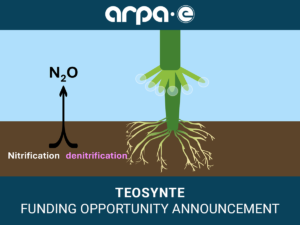 The Energy Department is looking for ways to cut the carbon intensity of ethanol production in half by lowering use of synthetic nitrogen (N) fertilizer on crops, and they are putting up $36 million to develop the technologies to do that.
The Energy Department is looking for ways to cut the carbon intensity of ethanol production in half by lowering use of synthetic nitrogen (N) fertilizer on crops, and they are putting up $36 million to develop the technologies to do that.
DOE’s Advanced Research Projects Agency-Energy (ARPA-E) announced the funding in the effort to lower nitrous oxide (N2O) emissions by 50% from the cultivation of corn and sorghum used for United States ethanol production.
The Technologies to Emend and Obviate SYnthetic Nitrogen’s Toll on Emissions (TEOSYNTE) program will emphasize strategies that lower the application of synthetic nitrogen (N) fertilizer on corn and sorghum fields. Lowering the application of synthetic N fertilizer would reduce greenhouse gas emissions as well as significantly lower farmers’ operating costs while maintaining crop yields.
There are various categories of projects under the funding opportunity that are designed to work toward:
Reduce imports of foreign synthetic N fertilizer by reducing the N fertilizer usage in U.S. agriculture;
Improve efficiency by saving billions in operational cost for U.S. farmers, and reduce carbon intensity for ethanol and ethanol-derived sustainable aviation fuel (SAF); and
Lower emissions of CO2 generated during N fertilizer production and N2O after N fertilizer application.
According to the ARPA-E Exchange the “Concept Paper Submission Deadline” is August 13, 2024 while the “Full Application Submission Deadline” is TBD.

